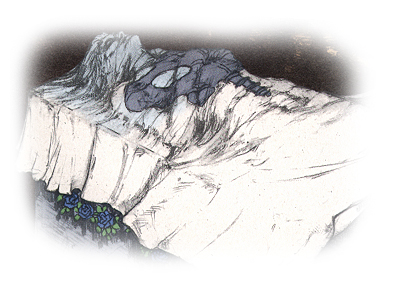|
|
|
"A King will forsake his kingdom. Life and Death will clash and fray. The oldest battle begins once more."
 hose are the words of the Three Ladies in one of their many manifestations as the Fates. And, by the final issue of Neil Gaiman's The Sandman, that prediction has come entirely true. The prediction that they set forth twice (once, spurring the Season of Mist storyarc, and another time in the prelude to The Kindly Ones) proves to be the major overall plotline to the 75-issue series, culminating in the death of Morpheus, Dream of the Endless, Lord-Shaper of the Dreaming. hose are the words of the Three Ladies in one of their many manifestations as the Fates. And, by the final issue of Neil Gaiman's The Sandman, that prediction has come entirely true. The prediction that they set forth twice (once, spurring the Season of Mist storyarc, and another time in the prelude to The Kindly Ones) proves to be the major overall plotline to the 75-issue series, culminating in the death of Morpheus, Dream of the Endless, Lord-Shaper of the Dreaming.
|
| The following is a list of characters, namely suspects, each with a motive for the Dream King's demise. While some longshots are included, the most obvious candidates also seems unlikely. The selection has been limited to only beings with enough supernatural "sway," intelligence, and sufficient cause to orchestrate Morpheus' elimination can be considered. And, only characters who appeared in the 75 issues and related specials of Sandman as they appear in trade paperback form are valid.NOTE: All images and characters are (C) Vertigo/DC Comics and are being used at this site only for educational purposes. In some instances, I have sharpened, spliced, or rearranged panels for greater clarity. Some images may be clicked upon for larger versions | ||||||
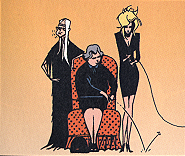 The Three Ladies
The Three LadiesAKA: The Kindly Ones, the Furies, the Fates, the Hecaeteae, the Muses, the Gorgons, the Triple Goddess Motive: Vengeance against Morpheus' son; professional obligation Regardless of what guise they work under, the Three Ladies play significant roles in the life of Dream and his acquaintances. They help him to locate his missing tools when he is first released from his decades of imprisonment (though, they claim they are no real help -- his troubles, they say, "are only just beginning"). They reunite him with his enslaved ex-wife, the titular "Calliope." And, as the Grey Ladies, they set in motion a chain of events that lead to Dream's possession of Lucifer's empty Hell and the release of his late love, Nada.
Though the Furies are one of the most direct tools to his destruction, are they the architects? As the Fates, if we can cleanly equate these roles to one and another, they do determine the lifeline of a being. And, during his first call for their help, the Crone is quick to remind Morpheus that he did not help them in some conflict with Circe. Finally, they may harbor a deep-seeded grudge, not against Morpheus, but against his son, Orpheus; during his brief journey to the underworld, the mourning musician made the Three Ladies as the Harpies cry, something for which he will never be forgiven according to Queen Prosephone. Would their rage against Orpheus spill over and fuel an already tenuous association with Dream?
| ||||||
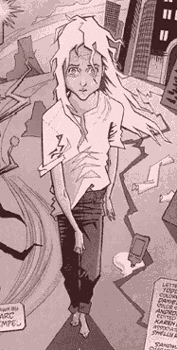 Lyta Hall
Lyta HallAKA: The Fury Motive: Mistaken vengeance over her child's kidnapping and husband and child's death Morpheus' isn't the only tragedy in The Sandman. Consider Lyta Hall. Before Sandman and the Vertigo line of comics, she was a mainstay in the DC Universe as the Amazonian daughter of an alternate Earth's Wonder Woman. When the DCU was overhauled in Crisis on Infinite Earths, she became the orphan daughter of the original Golden Age Fury (who, it is argued, is actually seen in The Sandman series as one of the Three Ladies named Helena in the nursing home Rose Walker visits). For a time she joined the super-group Infinity Inc., only to have her husband killed while she is pregnant with their child. His "reincarnation" as "The Sandman" is just an illusion, the work of two renegade nightmares who escaped the Dreaming and needed a dupe to "protect" their pocket dreamscape. So, even after living in this artificial realm, Lyta is sent back to Earth as Dream destroys his underlings' facade, leaving Lyta still pregnant and now without her love. Only one trace of him remains -- the baby she is carrying that gestated in the dreamscape, though Dream says he will one day come for the child, too.
In the end, Lyta realizes her error and wishes to undo her request for Dream's demise. However, she cannot. Dream dies (by Death's own hand, not the Kindly Ones') and Lyta is returned once again to Earth, this time without her son. Thessaly warns her that the quest to destroy Dream has made her many enemies, so she is forced into hiding until Daniel, now a manifestation of Dream assures her that he will watch over her to keep her safe. However, he is no longer truly her child. Lyta Hall is now totally alone.
Hers is a sad story, and her motives for first wanting Dream dead are clear. But, not even a former super-heroine has the power or, necessarily, the knowledge to take down a member of the Endless. Too many coincidences lead to her contact with the Kindly Ones, too many planned details. No one just happens upon the Three Ladies unless they were meant to. And, her quest for misappropriated vengeance would not have been possible without Dream's very recent killing of his immortal son. Like the Kindly Ones themselves, someone was pulling Lyta's strings...and a whole lot harder. | ||||||
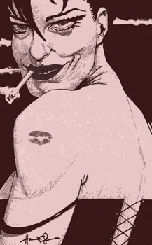 Desire
DesireAKA: Epithumia Motive: Sibling rivalry; inscrutable cosmic agenda The Good, the Bad, and...the Freaky. Desire of the Endless falls squarely into that final category. And, this is not because of his/her amorphous, transgendered identity. (I have absolute respect and appreciation of transgendered issues, so, to avoid any confusion, I will use the feminine pronouns when referring to Desire without the intent to label her strictly as a woman.) No, Desire is a bizarre character, because, like desire itself, her power and motive comes from an irrational, purely emotional (or hormonal) source. In fact, desire is motive in itself; people commit actions like murder because of their own desire. So, what would the personification of need and longing herself want?
It Doesn't that sound like a plan to have the Furies assail Dream? Yes... ...But not this plan. Desire already attempted to have Dream take his own blood in A Game of You. There, he nearly killed Rose Walker, a human dream vortex who endangered the boundaries of individual dreams. Unbeknownst to him, Rose was Desire's kin, her granddaughter, so slaying her would have given the Kindly Ones cause to go after him had Desire, well, desired. But, Dream did not kill Rose, fortunately, and later gave his sister a deadly warning to never attempt that again. Did she ignore his threat and go after him one more, lethal time?
Desire may not love her brother, she may even loathe him, but it doesn't sound like she killed him.
| ||||||
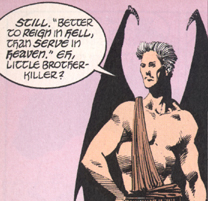 Lucifer Morningstar
Lucifer MorningstarAKA: Satan, the Devil, Lightbringer, King of Hell Motive: Sworn destruction; political opposition; boredom The elements seem to be all there. First, Morpheus had publicly embarrassed Morningstar in front of the legions of Hell back in Preludes and Nocturnes. For this, Lucifer swore to destroy Dream. Second, even as a fallen angel, he's an immensely powerful being, able to call upon The Kindly Ones, hire Loki and Puck, settle old scores for Thessaly, and manipulate individuals like Nuala, Lyta, and her friends, Carla and Eric. Third, he was at-large on Earth as the events unfolded, no longer constrained to Hell and able to put events in play at his discretion. Finally, who knows his feelings towards the Endless' lack-of-role in his Rebellion? Dream could easily have ignored Lucifer's entreaty for help in overthrowing God just as he seemed to have turned his back on helping the Kindly Ones with Circe. While Lucifer seems to have given up his quest and decided to walk the Earth (as the piano player and bar owner of "Lux"), could the Devil be in the details of Dream's death?
Not likely. This isn't, pardon the expression, sympathy for the devil; Lucifer already had his revenge on Dream by forcing the Key to Hell upon him in Season of Mist. Morpheus' handling of that situation gained him even more enemies, political complications, and embarrassment than Lucifer alone -- Sounds like turnabout is fair play. Also, Lucifer is wise, not vengeful (unlike some of his opposition, he might say); what would he gain from Morpheus' elimination? When Delirium comes to visit him at Lux, he tells her truly that he once did, in fact, want Dream destroyed, but now sees it as a waste of time and effort. Even if he's lying to her for indiscernible reasons, Remiel comes to him later about "the Dream King" situation, implying it is something that the angel's divine knowledge does not think Lucifer is part of.
Lucifer may be a trickster and a tormentor, but rarely is he shown as a liar. Certainly, he may have done it and for no better reason than the fact that he was bored as the leader of Hell. But, like Desire, his current actions didn't match his past ambitions. He may have wanted to destroy Dream in the past, but time changed both of them. A kinder, gentler Satan? Probably not. But probably not a guilty one either. | ||||||
 Thessaly
ThessalyAKA: Larissa Motive: Crime of passion; payment of outstanding debts The witch-woman known both as Thessaly and Larissa is a puzzle unto herself: She's a murderess, a sorceress, a guardian and...a lover. Yes, the same woman over whom Morpheus is moping at the beginning of Brief Lives turns out to be same woman he met in Alianora's land at the conclusion of A Game of You. The relationship, it appears, ended badly, evidenced by his sullen reaction and her own testimony in The Wake.
Of course, bad romances don't necessarily make for murders. One should also consider Thessaly's line of work and m.o.: She is the last of an ancient race of witch, extremely long-lived, reckless, and deadly. Her actions, those that often spit in the face of immortals and the divine, speak louder than words. She kills, pardon the pun, mysterious George when he sends his nightmare crows after her and the other resident ladies of their building. Thessaly also skins his face, plucks his eyes, and cuts loose his tongue. She pulls the moon out of orbit for her own goal of revenge, breaks Luz' neck as easily as she smashed the crow, and argues face-to-face with Dream of the Endless even as he holds their fate in his hands. As the Moon Aspect warns her, "Where others ask timorously, Thessalian, your kind commanded, directed, ordered...The others are dust now...and one day you, in your turn will join them...One day there will be a reckoning."
And that, I think, most easily rules her out as the mastermind of this plan. Her role in the plan is a reluctant one -- even though she is still plainly hostile to Morpheus when he visits, she also holds a great deal of anger towards Lyta. When she emerges after Dream's death, Lyta is told by Thessaly that, "Lots of people are going to want to hurt you or kill you for what you've done. Including me." Why would Thessaly set these events in motion to destroy a former lover that she may want hurt, but not killed? And, couldn't she have found an easier way to balance matters with the Three, rather than set a crazed mother in motion who needs physical protection by Thessaly herself?
In The Wake, the strong, stoic Thessaly weeps for Dream one last time, something she promised she'd never again do. Perhaps this near-immortal sorceress does not know herself as well as she thinks. Maybe she didn't know that having a role in Dream's torment and destruction would affect her. But, I don't think that she could have solely planned and implemented his demise without tripping over that part of herself that could have still, in fact, loved him. | ||||||
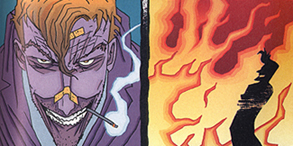 Loki
LokiAKA: Loki Scar-Lip, Loki Skywalker, Loki Giants Child, Loki Lie-Smith, Lt. Luke Pinkerton, Loki Mare's-Mother, Malice-Monger Motive: Personal debt; mischief Marvel Comics has its own version of the Norse god Loki as the arch-enemy of Thor, God of Thunder. The Sandman version proves that they hardly do the immortal trickster justice. He has hoodwinked Thor into believing an excrement-covered squirrel was his son, he has endured millennia of snake-venom torture, and -- when the realm of Hell goes up for grabs -- his brother and nemesis Odin comes to this most sly and cunning member of their clan for help in sealing the deal.
However, the only regal nature that this version of Loki seems to display is the fact that he's a royal bastard. Without a thought, he takes the place of an Asian deity entreating Dream for Hell and leaves the original to suffer Thor's brawny wrath while Loki escapes. When Dream discovers the deceit, he lets Loki go with the understanding that the trickster-god now owes Morpheus a favor. Rather than be happily owing and free, Loki cannot stand to be in anyone's debt -- it relies on a begrudging honor and hierarchy that he refuses to acknowledge. So, he becomes an eager accomplice to wrecking the Dream King by stealing a child, burning away its mortality, and driving a woman mad.
Loki: He has the power and he has the motive -- what does this candidate lack? Opportunity? No, there's plenty of time after Seasons of Mist for him to put the plan into effect. The only element of it that was already underway was Nuala's servitude in the Dreaming which began during the Hell's Key tale. Also, he certainly could have the connections to both mortal Earth and the divine beyond, allowing him to move both players like Lyta and Thessaly as well as Titania and the Kindly Ones into position.
In fact, there is only one thing he lacks that could rule him out as a candidate: Patience. Most of Loki's ploys are short-run, immediate pay-offs. For an immortal god, he commits very immediate tricks. In fact, it's impressive that he lasted behind the facade of Lt. Luke Pinkerton as long as he did before exploding in fury and torching Lyta's poor friend, Carla. Dream's set-up was methodical, certainly demanding the skill of immortal experience and treachery, but also patience and forbearance. Remember, if Eric and Carla, Lyta's acquaintances, were not either planted or manipulated, the conspirator had to just wait until Lyta finally left her baby's side by their urgings. And, waiting is not the best trait of the Skywalker.
Finally, it seems unlikely to me that the master planner of this endgame would have been as easily bested by the Corinthian as Loki was. Neck snapped, Loki was left there for Odin to collect -- not exactly the ultimate result of a masterful ploy. No, as Puck said, the devilish duo was working for someone; perhaps they were even working for someone who Loki also owed, thereby negating two obligations, one honorably and one dishonorably, at once. But who besides Dream could have had Loki in their pocket?
| ||||||
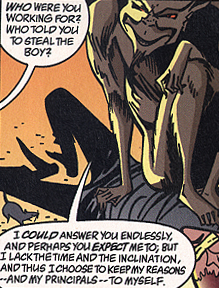 Puck
PuckAKA: Robin Goodfellow, "That Merry Wanderer of the Night" Motive: Mischief; employment People have been trying to decipher and deconstruct Puck of A Midsummer Night's Dream for literally hundreds of years. So, Gaiman's Puck, being a direct derivation of that character, could certainly prove equally as vexing and difficult to unravel.
However, I have to respectfully disagree with the talented and brilliant Hy Bender when he says in his remarkable book, The Sandman Companion, that Puck is inspired to join in capturing Daniel purely out of a desire to cause mayhem. There are many wonderful ways for Puck to stir up chaos -- picking a fight with one of the Endless does not seem like a smart one, even for a "giggling-dangerous-totally-bloody psychotic-menace-to-life-and-limb" as Peaseblossom puts it...
...unless there is something to gain from it. I, for one, believe Puck when he implies that there were employers behind his and Loki's actions. Notice that he says "inclinations" and "principals" -- not the homonymous "principles" -- which verbally illustrates (as Shakespearean characters are wont to do) both a little personal wanting to do this ("inclinations") and a supportive benefactor to the whole endeavor ("principal"). Even if this literary pseudo-analysis is off-the-mark or an over-reading, I don't think that scrutinizing his other comment is out-of-line: "I could answer you endlessly, and perhaps your expect me to..." -- He's clearly hinting at (or, misleading us towards) one of the Endless themselves!
Therefore, if it is one of the Endless -- surely, any one of them has the power and influence to move pawns in any number of realms -- who could it be? Death is certainly innocent, at least as innocent as Death can be in a death. She never seemed to actively select individuals to die and clearly never enjoyed becoming involved (as she was, much to her annoyance, in "Facade" and "Orpheus" with Element Girl and Orpheus, respectively). Also, Destiny sticks to his book, which seldom ever tells him to do something -- he was rather shocked, as shocked as Destiny could be -- when the Grey Ladies had him call a meeting from his garden. His response? "Nothing begins here." Finally, Delight is too disjointed to pull together such a plan; she has a hard enough time finding her dog.
So, if Puck is incriminating one of the Endless, it could only be Despair (who I personally tend to discount as the weakest and least active of the Endless), Desire, Destruction, or Dream himself. Stretch the definition a little and, I suppose, you can also include the future Dream, Daniel, who is not above suspicion even as a baby. But, if Puck is mis-directing us, who would he be doing this for? That is, to whom does he show enough loyalty to both carry out their doings and not reveal their name...?
Read on... | ||||||
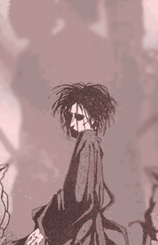 Morpheus
MorpheusAKA: Dream of the Endless, Lord-Shaper, Onieros, Lord L'Zoril, Murphy, etc. Motive: Guilt; exhaustion; trauma Could the answer be...suicide? That depends on a whole bunch of other questions. Namely, was the imprisonment at Wynch Cross far more traumatic that Dream ever let on? Did it irreversibly alter Morpheus, forcing him to face his coldness towards others and over-weighing of responsibility? Did it create such a schism that the only way to extricate himself from it was a subconscious attempt at death? For that matter, can an immortal being ever actually even admit it, do anything other than destroy themselves, when they want "out?"
Though very few of those questions can be answered definitively, we already have the solution to the last one: Yes, an immortal being can extricate themselves from their station. After all, Lucifer did it and with relative ease. So did Destruction, it would seem, though the circumstances and motivations of his resignation can still only be guessed at. Additionally, some trauma turned Delight in Delirium, an alteration, for certain, but hardly a death. However, as it goes for mortals, what is true for one Endless or divine being may not be true for them all.
If Dream killed himself -- if he set the players in motion by hiring Loki & Puck, freeing Nuala, and maddening Lyta -- it was not out of god-like post-traumatic stress. No, not trauma, at least not directly. If he killed himself over anything is was guilt. His time of imprisonment made him feel vulnerable, trapped, and powerless -- in short, it made him feel mortal. Once released, he nicely regained his might and balance...except the experience haunted him. He saw how merciless and unforgiving he had been to many well-intentioned individuals over his year's of existence. And his cruelty, figuratively, killed him. He did not like who he was, nor could he block out this realization entirely.
I do think Morpheus had a death-wish, but he didn't hire anyone to finish him off; in the same way Shakespeare's Romeo was zealously dedicate to the principles of love, so too was Morpheus with being one of the Endless. However, also like Romeo, that dedication did not mix well with his reality (or, his new reality after the imprisonment) and led to his demise. He couldn't be the Dream he wanted, no, needed to be, so he prepared the mortal baby Daniel to take his place as a kinder, gentler Dream. There was no plan, per se. It was simply a matter of time before he made enough of a misstep to bring about his destruction. Nuala (looking strangely like Lyta speaking to the Furies as she says this) is even able to see it: "You want them to punish you, don't you?" He cannot answer; only admit that he has changed, but, by asking Nuala, his slave of many years, if she has ever been imprisoned, he is still marvelously unself-aware. Does he ever know he wanted to die?
So, if this story can be taken as a parable or allegory for Dream's downfall, who is the lover that consumes him at the end?
Again, read on... | ||||||
 Boss Smiley
Boss SmileyAKA: Prince of the World Motive: Revenge; power play On some other Earth, in some other America, Boss Smiley is in control of it all. Or, rather, was until a optimistic, young upstart named Prez Rickard came along and became the youngest American President ever and wouldn't play ball with the tyrant-phantasm. Boss Smiley finally had the boy in his clutches, though, once Prez died - or so he thought. Enter Morpheus, acting on behalf of his sister, who liberates Prez from any servitude to Boss Smiley. After all, Prez's life has been an exceptional story and, as he says, Dream is the Prince of Stories.
This infuriates Boss Smiley who vows to get revenge on Morpheus. When Prez apologizes for causing Morpheus any trouble, the Endless being assures him not to worry: "He would not be the first to threaten me."
Could this minor character actual be the cause of Morpheus' demise?
Simply...not bloody likely. This big fish in his little pond wouldn't last a round against Morpheus. The Dream King would do the same to him as he did to Azazel in Season of Mist -- very easily and passively put him in his place.
Rather, I've honored Boss Smiley with a place on the suspects page to represent all the little deities and minor gods that Morpheus has pissed off in his time. In the same collection of stories as Prez' "The Golden Boy" is a tale of the faerie Cluracan and his mission on behalf of Queen Titania to the City of Aurelia. When things go badly for him, Morpheus once again intercedes, this time on behalf of Nuala. (Though this and Prez' story have no exact time, Nuala seems to already be in Dream's employ; therefore, they seem to support the idea that this is the post-imprisonment Dream, subconsciously intent on putting things right and helping those loyal to him where he may have once just stood aside.) Had Aurelia's leaders lived long enough to hear of the Dream King's intervention, Morpheus could have easily added another enemy to his long list.
So, Boss Smiley? Please...But, he does help illustrate Dream's freedom to interfere in the kingdoms of others. Notably, the faerie kingdom. | ||||||
 Titania
TitaniaAKA: Queen of the Fay Motive: Crime of passion; political cover-up As she stands atop a mount at the wake for the Dream King, Titania states a very telling statement to three former lovers of Morpheus, "My association to the Lord Shaper? That is none of your affair. I am the Queen of Faerie. I keep my own counsel."
Perhaps. But that private "counsel" doesn't seem too hard to discern. Their actions, Morpheus' and her own, speak louder than words. Dream enters into a pact with William Shakespeare just to create a play in memoriam of her people departing the Earth. He says that he did it for all the diversion and entertainment she and her people afforded him. She finds it familiar to a "tale sung once, in Greece, by a boy with a lyre." While at its premiere, he breaks into a hugely uncharacteristic self-reflection to her, asking her if he has done the right thing in regards to the price people pay for what they want. Titania has no response to this outpouring, but, as this little show called A Midsummer Night's Dream plays on, she does tell him that he will always be welcome in her kingdom. Her husband, Lord Oberon, says nothing; perhaps he doesn't hear or maybe he's engrossed with the play.
But, it turns out Dream's prediction is true -- "That King Auberon and Queen Titania will be remembered by mortals, until this age is gone." And, we do today. We remember their fighting, their lovers, their duplicity. "You are a deep one," Titania comments to Dream. "I would I could fathom your motives...?" They could as easily have been to honor the royal couple as to disgrace them. Perhaps that is why Oberon (whose name I choose to spell in the Shakespearean fashion because...well, those would be my own motives for you to fathom, wouldn't they?) calls for the Faerie party to leave early, before its conclusion. Perhaps not...but... If I've timed their affair correctly, then Morpheus' only other chronicled affair would have been his recent one with Thessaly. How concerned should he be about a woman scorned, especially when that woman is Queen of the Fay? As Cluracan warns, "It's bad luck to cross the fair folk." She is not above conniving, shown by her orders to break up an upcoming alliance by any means necessary in World's End. And, did Oberon ever catch on? ...Well...if he didn't, and Dream was on the suicide run I theorized above, Titania could easily have seen him as a liability. One that she might take joy in eliminating.
In fact, I think a lot of signs point to her until the final Act. When Dream does die at the end of Kindly Ones, she is immediately notified by a bolt of lightning. And, for a moment, she has the face of one in immense pain and grief. Not only that, she is also a member of the funeral dirge that crosses through the sky in World's End and an attendant at The Wake. Plainly, she grieves for Dream.
Is that enough to absolutely clear her from all suspicion? Certainly not. But, it does provide enough doubt to allow the primary suspect - the most conspicuous in his inconspicuousness - to move to into the interrogative spotlight.
Not Titania, maybe, but her husband...Oberon. | ||||||
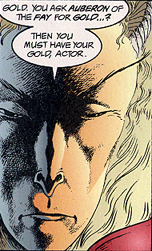 Oberon
OberonAKA: Auberon, King of the Fay Motive: Infidelity Who better to kill a King than a King?
In my mind, so many factors imply or implicate Oberon that it might be more plainly illustrated if we take each element at a time:
If Morpheus' death was intentional and executed by a mastermind behind-the-scenes, Oberon seems, in my mind, to be the best candidate on paper. There are only three circumstances that could exonerate him, two of which would have to come from the mouth of creator Neil Gaiman himself. First, it is possible that the simplest answer, while not the best, is still correct and that it was Desire, as awkward an answer as that may be. Second, perhaps Oberon is too minor a character in Gaiman's world for him to even be thought "behind-the-scenes;" perhaps he's just gone and we, as the audience, were never intended to take his sole appearance all that seriously.
Only one other explanation holds if one wishes to declare Oberon innocent. And, interestingly enough, it lies with an equally absent character from the series who may have inadvertently caused the chain of events leading to Morpheus' death....his own brother.
| ||||||
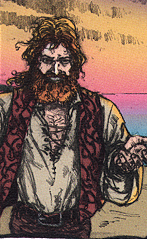 Destruction
DestructionAKA: Olethros, The Prodigal Motive: Incidental duty There is another approach to this dilemma. I have been analyzing suspects based on who could have planned out the murder and had the power and reason to implement it. But, what if Dream's death was more of a natural event than a planned one? That is, someone or something still caused it, but only inadvertently. Then, Reason and Opportunity could be deleted from the equation, leaving only Means. And, no being has greater pure Means to demolish a life and kingdom than Dream's own errant brother, Destruction of the Endless.
An associate of mine, Meghan Fowler, has theorized that Destruction actually causes mayhem for those around him as much by presence as by action. That is, he is a true embodiment of destruction, bringing it with him wherever he goes. This theory does hold some water given the limited histories we know of the Endless. Destruction had a hand in the events that caused Delight to turn into Delirium. Likewise, he is much beloved and missed by Despair, herself a second version of that office -- could Destruction have lead to the demise of the first?
This could be the reason he abandons his post -- he may have become aware, too aware, of the destruction he accidentally brings to others, particularly those he cares about. When we meet him in the modern day during Brief Lives, he is only interested in acts of creation: cooking, writing, painting, etc. Morpheus, who has joined Delirium in seeking him out, don't really disturb any of his activities, yet he had several traps and signals in place for anyone that may come pursuing him. If these mechanisms were not for his sake...they must have been to deter any followers from finding him for their own sake. In fact, once he meets with his brother and sister, Destruction packs up once again, hoping and asking not to be found.
Did this encounter with Destruction lead to Dream's demise? Perhaps. His pursuit certainly can be seen as the catalyst for Morpheus' pursuance by the Kindly Ones -- the final killing of his son, Orpheus. Interaction with Destruction (who speaks of all things changing and lack of permanence) brings things full circle: Orpheus took Destruction's advice, which led to his miserable immortality, and the encounter with Destruction leads to Dream's ending of that life. Now that Morpheus has taken his own blood, the Kindly Ones may pursue him if entreated.
Two curious events are chronicled in The Wake that merit reflection. First, instead of going to Morpheus' funeral (a la Oberon), Destruction actually comes to visit Daniel, the new manifestation of Dream. They speak quite politely and kindly to each other -- this new Dream can more easily accept Destruction's notions on change, especially since he is the product of a major change -- yet Destruction goes out of his way to ensure Daniel that he means his brother no harm. With no overt threat at hand, why is this said? Is it an assurance that none of the symptomatic mayhem of being in his presence will occur? Or, could it be read as a subtle apology for the destruction of Dream's former self? Add to that the curious event in The Wake's epilogue, where Hob Gadling has a dream that includes Morpheus and Destruction, a man/being he has never met before. They walk together on the beach as friends, laughing and talking, but the inclusion of Destruction is very odd -- What does it signify that Hob dreams the late Morpheus accompanied by himself and Destruction? Could this be another attempt by Destruction to make amends?
If someone arranged for Daniel to be taken, then holding Destruction as a true suspect is difficult -- someone else had a malicious intent and took advantage of Orpheus' death. But, if Loki and Puck were just being mischievous, if they were truly working for nobody and wished merely to harass the Dream King, then Lyta's desire to kill Morpheus is just unfortunately well-timed. Well-timed, yes, or brought about by Destruction's terrible, though unintended, nature. | ||||||
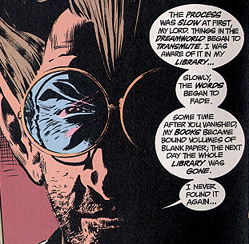 Lucien
LucienMotive: Job security; possessiveness Never in the history of existence has there been one as devoted to his job as Lucien the Librarian. And while his dedication to master and duty make him an honestly unlikely suspect, it is worth examining the possible motives of those close to Dream, if only to uncover the effect he has on those who serve and honor him. Consider Lucien a representative of the anti-Boss Smileys, such as Matthew, Mervyn Pumpkinhead, Corinthian, Cain, and Abel -- all those who are dedicated to Dream, yet still take the brunt of his pain and actions.
When Dream was imprisoned, however, all of that fell apart. After centuries of careful collection and care, the library slowly began to crumble for Lucien. As he said, "Slowly, the words began to fade...My books became bound volumes of blank paper; the next day the whole library was gone. I never found it again." The sheer trauma of losing the one thing he has worked ages on is buried beneath what he says, but readily apparent on his features.
Dream returns, of course, as does the full glory of the Dreaming, but things are not perfect. Some dreams have gone missing, such as Brute and Glob, the "benefactors" of Daniel's father, the mock "Sandman." And, many of the books are still in abstentia. Even by Seasons of Mist, Lucien is still recooping his loss, finding missing books, rebuilding the library, etc. Having Dream depart again, this time to Hell, has terrible potential repercussions to Lucien -- If Dream is imprisoned again, then the Dreaming and the library could easily fall apart once more. Everything Lucien has worked for with be for naught.
So, would Lucien actually use all the knowledge of his library to eliminate the foolhardy Dream in place of another one, less threatening to his dear library? ...No, probably not. But, I think that at least discussing this possibility might show how Morpheus' behavior (both over the centuries and since his imprisonment) affects those around him. Certainly, Dream's lovers fair poorly: Nada is condemned to Hell, Calliope is betrayed then imprisoned, and the scarred Elianora seems to have perished mysteriously. Likewise, Dream's associates gain no real protection from his interaction (how many people die because of his quest to find Destruction in Brief Lives?) and his own servants must endure whatever hardship he brings to the Dreaming, either due to his mood or outside parties. Does Morpheus, in the end, wind up wreaking more incidental ruin than Destruction does? | ||||||
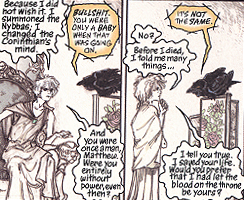 Daniel
DanielAKA: Dream of the Endless Motive: Ascendance Outside of the Kindly Ones and the murderer himself/herself/itself/themselves, only one being had anything to really gain from Morpheus' death: Daniel. The boy goes from mortal baby (albeit, one of peculiar and interesting origins) to a manifestation of the Endless. Certainly, on paper, as it were, that is a major power-jump. From mortal to immortal, toddler to god, preschooler to omniscient. And, he got it all because he was Dream's heir.
As far back as A Doll's House, it seems, Daniel was named to be Morpheus' successor. Morpheus tracks down Brute and Glob inside the head of Rose Walker's brother. There, they have constructed their own mini-Dreaming and enlisted their own Sandman, the late Hector Hall of DC Comics' Infinity Inc. With him is, you guessed it, his pregnant wife Lyta. Morpheus removes all of them from the boy's mind, ships the two little dreams off for punishment, and sends Hector on to the Great Beyond (where, later, he is pulled back in the form of the new Dr. Fate for the revamped JSA). This leaves Lyta all alone, back on Earth, and nine months pregnant. Morpheus leaves her saying that he will return for her child, not explaining to the distraught woman that since it gestated in the Dreaming it will have special value and abilities. He just leaves her, carelessly (or intentionally?) allowing her to grow embittered to him.
He visits Lyta again, during Season of Mist in preparation to take on Lucifer and whatever may befall him, and once more he gives her reason to fear him. But, he does seem to already be in close connection with the boy. Morpheus informs her that the baby's name is Daniel, almost as if the baby himself told Morpheus so. Daniel is the "precaution" Dream spoke of to his servants in the event of his own destruction at the hands of Lucifer. Daniel can already access the Dreaming's inhabitants, as he did with Cain, Abel, and Eve in Fables and Reflections' "Parliament of Rooks." He is even able to bring objects back from the Dreaming, such as Matthew's raven feathers. The boy, certainly, has incredible potential.
But, how much of that potential was already realized before Dream's death? He seemed able to communicate with Morpheus and even the Corinthian (who did not kill Matthew, apparently, because of Daniel's desires). If Daniel was already aware and cognizant, could he have stretched his power further to move Morpheus along and make himself Dream?
...Naaahhh...A powerful baby had himself stolen to drive his mother mad and bring the ancient Furies down on his predecessor? He would have had to stretch his power, for sure, but buying that idea (over all the other suspects) would be an even greater stretch...
| ||||||
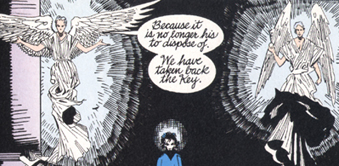 Remiel and Duma
Remiel and DumaAKA: The Caretakers of Hell Motive: Bitterness; incidental duty To be blunt, neither Remiel or Duma were pleased to be divinely screwed with possession of Hell at the end of Season of Mist. When Lucifer abandons his post and closes Hell, he leaves Morpheus with the key and the headache of determining what to do with it. All sorts of otherworldly beings come knocking at the Dreaming's door, threatening, coaxing, or bribing Dream to give them possession of the empty Hell. In the end, despite the wrath he might incur from the other interested parties, Dream defers to divine will, giving Hell back to the higher power that created it: The angels from Heaven take the key.
In doing so, however, the angels Remiel and Duma unwittingly become exiled from Heaven -- their home is Hell now. Since Duma is under a vow of silence, only Remiel can express his displeasure...which is great. However, they reluctantly assume their new post and leave Dream to deal with any disgruntled guests.
While Remiel and Duma probably do not hold Dream accountable for their situation, there is one act that puts some suspicion upon them. Long before the Kindly Ones actually come looking for Morpheus, Remiel visits Lucifer at his nightclub, the Lux. He asks the devil if he will reassume his former position to which Satan replies no. Remiel eventually becomes so flustered that he must leave. He reports to his cohort Duma that he departed before he got to his intended business, "We didn't even begin to talk about the Dream King situation."
What "Dream King situation?" While some events are already in motion, nothing has yet come to affect Morpheus by the time Remiel visits the Lux. It would seem that the angels have some foreknowledge of what is to come and they want to share it with Lucifer of all people! It's a curious situation to say the least. If they had advance knowledge of what was to befall Dream, why didn't they intercede? And, if they were planning to, why were they thinking to enlist Lucifer, who has never exactly been a lover of the Dream King? Conversely, were their motives more sinister? Were they in support of his destruction? Moreover, did they have a hand in it, looking to settle the score for his part in consigning them to Hell? If so, they could have been going to Lucifer for help, knowing, again, of his former pledge to destroy Morpheus.
There's truly not enough to connect them with the actual murder scheme...Regardless, whatever their purpose, the angels did not intercede to help Dream if they did have knowledge of his coming peril. Rather, they sat idly by.
It would seem that one cannot trust in the angels. | ||||||
